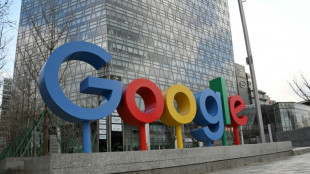-
 Afghan FM tells Pakistan's top diplomat deportations are 'disappointment'
Afghan FM tells Pakistan's top diplomat deportations are 'disappointment'
-
British cycling icon Hoy and wife provide solace for each other's ills

-
 Money, power, violence in high-stakes Philippine elections
Money, power, violence in high-stakes Philippine elections
-
Iran, US hold second round of high-stakes nuclear talks in Rome

-
 Japanese warships dock at Cambodia's Chinese-renovated naval base
Japanese warships dock at Cambodia's Chinese-renovated naval base
-
US Supreme Court pauses deportation of Venezuelans from Texas

-
 Pakistan foreign minister arrives in Kabul as Afghan deportations rise
Pakistan foreign minister arrives in Kabul as Afghan deportations rise
-
Heat and Grizzlies take final spots in the NBA playoffs

-
 Iran, US to hold second round of high-stakes nuclear talks in Rome
Iran, US to hold second round of high-stakes nuclear talks in Rome
-
Humanoid robots stride into the future with world's first half-marathon

-
 Migrant's expulsion puts Washington Salvadorans on edge
Migrant's expulsion puts Washington Salvadorans on edge
-
Plan for expanded Muslim community triggers hope, fear in Texas

-
 Pakistan foreign minister due in Kabul as deportations rise
Pakistan foreign minister due in Kabul as deportations rise
-
White House touts Covid-19 'lab leak' theory on revamped site

-
 Dodgers star Ohtani skips trip to Texas to await birth of first child
Dodgers star Ohtani skips trip to Texas to await birth of first child
-
US senator says El Salvador staged 'margarita' photo op

-
 Ford 'adjusts' some exports to China due to tariffs
Ford 'adjusts' some exports to China due to tariffs
-
Thomas maintains two-shot lead at RBC Heritage

-
 US to withdraw some 1,000 troops from Syria
US to withdraw some 1,000 troops from Syria
-
Four killed after spring storms wreak havoc in the Alps

-
 Spurs' Popovich reportedly home and well after 'medical incident'
Spurs' Popovich reportedly home and well after 'medical incident'
-
Trump goes to war with the Fed

-
 Celtics chase second straight NBA title in playoff field led by Thunder, Cavs
Celtics chase second straight NBA title in playoff field led by Thunder, Cavs
-
White House site blames China for Covid-19 'lab leak'

-
 Norris edges Piastri as McLaren top Jeddah practice
Norris edges Piastri as McLaren top Jeddah practice
-
Trump warns US could ditch Ukraine talks if no progress

-
 Judge denies Sean 'Diddy' Combs push to delay trial
Judge denies Sean 'Diddy' Combs push to delay trial
-
80 killed in deadliest US attack on Yemen, Huthis say

-
 Lebanon says two killed in Israeli strikes in south
Lebanon says two killed in Israeli strikes in south
-
Trump says US will soon 'take a pass' if no Ukraine deal

-
 F1 success is 'like cooking' - Ferrari head chef Vasseur
F1 success is 'like cooking' - Ferrari head chef Vasseur
-
Cycling mulls slowing bikes to make road racing safer

-
 Macron invites foreign researchers to 'choose France'
Macron invites foreign researchers to 'choose France'
-
Klopp 'happy' in new job despite Real Madrid rumours: agent

-
 Alcaraz into Barcelona semis as defending champion Ruud exits
Alcaraz into Barcelona semis as defending champion Ruud exits
-
Vance meets Italy's Meloni before Easter at the Vatican

-
 Evenepoel returns with victory in Brabantse Pijl
Evenepoel returns with victory in Brabantse Pijl
-
Maresca confident he will survive Chelsea slump

-
 Mob beats to death man from persecuted Pakistan minority
Mob beats to death man from persecuted Pakistan minority
-
Lebanon says one killed in Israeli strike near Sidon

-
 Arsenal's Havertz could return for Champions League final
Arsenal's Havertz could return for Champions League final
-
US officials split on Ukraine truce prospects

-
 Client brain-dead after Paris cryotherapy session goes wrong
Client brain-dead after Paris cryotherapy session goes wrong
-
Flick demands answers from La Liga for 'joke' schedule

-
 'Maddest game' sums up Man Utd career for Maguire
'Maddest game' sums up Man Utd career for Maguire
-
Trial opens for students, journalists over Istanbul protests

-
 Gaza rescuers say Israeli strikes kill 24 after Hamas rejects truce proposal
Gaza rescuers say Israeli strikes kill 24 after Hamas rejects truce proposal
-
'Really stuck': Ukraine's EU accession drive stumbles

-
 'Not the time to discuss future', says Alonso amid Real Madrid links
'Not the time to discuss future', says Alonso amid Real Madrid links
-
74 killed in deadliest US attack on Yemen, Huthis say

Web-tracking 'cookies' meant to protect privacy: inventor
The data-tracking "cookies" at the heart of concerns over online privacy were meant to shield people, rather than serve as cyber snoops, their inventor told AFP.
California-based engineer and entrepreneur Lou Montulli said the original "cookie" he created decades ago was intended to make life online easier by letting websites remember visitors.
Yet the technology has become a lightning rod, attacked for helping tech companies collect data on consumers' habits key to the targeted web ad business that makes many billions of dollars per year.
"My invention is at the technological heart of many of the advertising schemes, but it was not intended to be so," said Montulli, who created them in 1994 while an engineer at Netscape.
"It is simply a core technology to enable the web to function," he said.
Google joined a growing list of tech companies this week by announcing a new plan to block certain types of cookies, after the online ad giant's previous proposals were roundly criticized.
When discussing his invention, Montulli said the software snippets that let a website recognize individuals helped make possible features such as automatic log-ins or remembering the contents of e-commerce shopping carts.
Without what are called "first-party" cookies -- which also are used by websites to interact directly with visitors -- every time a person went online, they would be treated as though it were their first time.
But Montulli pointed to trouble with so-called "third-party" cookies, those generated by websites and tucked into visitors' browsers, and ad networks that aggregate data from those snippets.
"It is only through collusion between many websites and an ad network that ad tracking is allowed to happen," Montulli argued.
Websites share activity data with ad networks, which then use it to target ads for all their members.
- Online ads arms race -
"If you search on some strange niche product and then you get bombarded with ads for that product at a number of websites, that is a weird experience," Montulli said.
"It is normal human pattern recognition to think if they know I was looking for blue suede shoes, they must know everything about me; then think I want to get out of this."
Governments have taken notice, with the latest consequence being French authorities fining Google and Facebook 210 million euros ($237 million) this month over their use of cookies.
If one website in a network also collects personally identifying information about a user, say a name or email, that could be "leaked" in a way that enables a browser to be associated with a person.
"It's a network effect of all these different websites colluding together with the ad trackers," Montulli said. "Cookies were originally designed to provide privacy."
He said one possible response would be to stop targeting ads and start charging subscriptions for online services, which run on online advertising revenue.
Montulli also supports phasing out third-party cookies, but warned getting rid of the software snippets altogether would drive advertisers to employ more stealthy tactics.
"Advertising will find a way," he said. "It will become a technological arms race; considering the billions of dollars at risk, the ad industry will do what they need to keep the lights on."
Turning off third-party cookies could also unintentionally punish small websites by shutting them out of targeted ads that make money, giving even more power to tech giants such as Apple, Google and Facebook-parent Meta.
Regulation that keeps cookies in use, mandating controls such as letting users opt in or out of sharing data, may be the only viable long-term solution, Montulli said.
"You really couldn't use the web without cookies," he said. "But, we are going to need to be more nuanced about how they are used in advertising."
I.Meyer--BTB




